
Abū Zakariyyā Yaḥyā ibn Sharaf al-Nawawī (Arabic: أبو زكريا يحيى بن شرف النووي;, popularly known as al-Nawawī or Imam Nawawī, was a Sunni Shafi'ite jurist and hadith scholar. Al-Nawawi died at the relatively early age of 45. Despite this, he authored numerous and lengthy works ranging from hadith, to theology, biography, and jurisprudence that are still read to this day.

Ibadan is the capital and most populous city of Oyo State, in Nigeria. It is the third-largest city by population in Nigeria after Lagos and Kano, with a total population of 2,649,000 as of 2021, and over 3 million people within its metropolitan area. It is one of the country's largest city by geographical area. At the time of Nigeria's independence in 1960, Ibadan was the largest and most populous city in the country, and the second-most populous in Africa behind Cairo. Ibadan is ranked one of the fastest-growing cities in sub-Saharan Africa, according to the UN Human Settlements Program (2022). It is also ranked third in West Africa in the tech startups index. Ibadan joined the UNESCO Global Network of Learning Cities in 2016.

Ilorin is the capital city of Kwara State located in the Western region of Nigeria. As of the 2006 census, it had a population of 777,667, making it the 7th largest city by population in Nigeria. Surrounding the historic central district with its traditional single-story red-mud houses with thatched straw roofs and numerous mosques, all protected by a mud wall, the modern city is an industrial, commercial, and educational centre.

Islam is one of the largest religions in Nigeria and the country has the largest Muslim population in Africa. In 2018, the CIA World Factbook estimated that 53.5% of Nigeria's population is Muslim. Islam is predominantly concentrated in the northern half of the country, with a significant Muslim minority existing in the southern region. Most of Northern Nigeria is governed under Sharia law, while the rest of the country is governed under secular law.
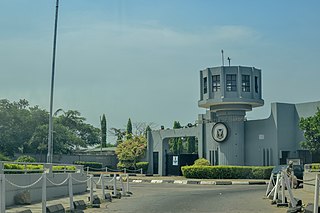
The University of Ibadan (UI) is a public research university in Ibadan, Nigeria. The university was once a college of the University of London. The college was established in 1948 as University College Ibadan, one of many colleges within the University of London. It became an independent university in 1962 and is the oldest degree-awarding institution in Nigeria. Through its graduate network, the University of Ibadan has contributed to the political, industrial, economic and cultural development of Nigeria.
Chief Ògúnwán̄dé "Wán̄dé" Abím̄bọ́lá is a Nigerian academician, a professor of Yoruba language and literature, and a former vice-chancellor of the University of Ife. He has also served as the Majority Leader of the Senate of the Federal Republic of Nigeria. Chief Abimbola was installed as Àwísẹ Awo Àgbàyé in 1981 by the Ooni of Ife on the recommendation of a conclave of Babalawos of Yorubaland.
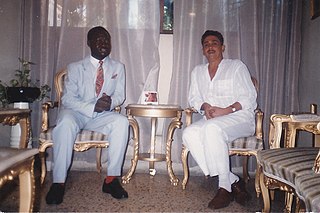
Abdul-Fattah Abu-Abdullah Taiye Ejire Adelabu or simply Sheikh Adelabu, also known as Al-Afriqi (الإفريقي) or Shaykh Al-Afriqi is a Nigeria-born British Muslim scholar, writer, academic, publisher and cleric from Osogbo, capital city of Osun State, Nigeria.
Ansar-ud-Deen Society of Nigeria is a Muslim organization established for the purpose of the educational development of Muslims and also as a body to enhance the moral and social development of the Muslim community in Lagos. It was founded in 1923 as a non-sectarian and non-political educational association, although there are doubts about its non-political stance.
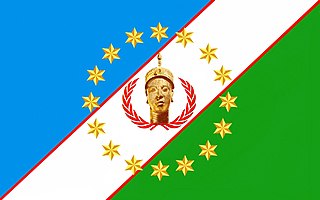
The Yoruba people are a West African ethnic group who mainly inhabit parts of Nigeria, Benin, and Togo. The areas of these countries primarily inhabited by the Yoruba are often collectively referred to as Yorubaland. The Yoruba constitute more than 48 million people in Africa, are over a million outside the continent, and bear further representation among members of the African diaspora. The vast majority of the Yoruba population is today within the country of Nigeria, where they make up 20.7% of the country's population according to Ethnologue estimations, making them one of the largest ethnic groups in Africa. Most Yoruba people speak the Yoruba language, which is the Niger-Congo language with the largest number of native or L1 speakers.
Omupo or Omu-ipo is an ancient Igbomina-Yoruba town situated in the southeastern part of Kwara State. It is one of the prominent towns in Ifelodun Local Government Area of the State. It is the headquarters of 34 communities of Omupo District, the headquarters of Omupo/Idofian Area Council of Ifelodun Local Government. Omupo Constituency was also created in 1979 for a representative to the Kwara State House of Assembly.
Joseph Adebowale Atanda was a Nigerian native of Eruwa, in Oyo State, Nigeria. He obtained his B.A. (Hons) in History in 1964 from the University of London and a PhD. in history in 1967 from the University of Ibadan.
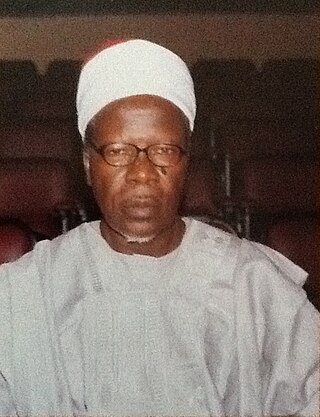
Zakariyau Idrees-Oboh Oseni, is a prominent Arabic and Islamic Studies Scholar, an Imam and a poet from Nigeria. He was trained at the University of Ibadan where he obtained a Certificate in Arabic & Islamic Studies (1971), B. A. First Class Hons. in Arabic Language and Literature (1977), M. A. in Arabic & Islamic Studies (1980) and PhD. in Arabic Language & Literature (1984). He has over 33 years' experience in lecturing in Arabic Studies and aspects of Islamic Studies. He has over 100 publications in Arabic, Islamic Studies and Literature out of which are three collections of poems in English, three plays and a collection of short stories in Arabic, and a collection of Afenmai Proverbs translated and annotated. He is an editorial consultant to fifteen academic journals in Nigeria and beyond. He was the Head of the multidisciplinary Department of Religions (1997–1999) and the Department of Arabic (2008–2009), University of Ilorin. Not only that, but he served as a Visiting Professor and Head, Department of Languages, Al-Hikmah University, Ilorin, from October 2011 to October 2012. He also served as the Dean, Faculty of Arts, University of Ilorin, Ilorin from 2009 to 2011. He is currently the Head of Department of Arabic, University of Ilorin. Furthermore, he is the Chief Imam and Waziri of Auchi. Moreover, he is a Fellow of Arabic Studies, Nigeria (FASN), Fellow of the Academy of Religion (FAR) and member of the Consultative Committee of 'Ulama' under the Nigerian Supreme Council for Islamic Affairs. He is happily married with children.
Ọba Timi Abibu Sàngólámì (Ọ)Lágúnjú was a Yoruba monarch of the town of Ede, and leader in the 19th century. He was the first Muslim Timi that Ede produced, he also belonged to the first generation of Yoruba Muslims who held high political office in the pre-colonial era and who used their positions to enhance the growth of his town, Ede and his religion, Islam. Indeed, Abibu Lagunju was the second Muslim Oba in Yorubaland given the fact that he was already on the throne for a couple of years when, in November 1857, the American Baptist Missionary, Reverend W.H. Clarke, visited Ede.
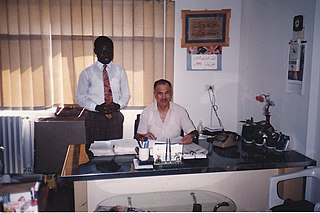
Shawkiy Abu Khalil was a Syria-based Palestinian author and researcher, who wrote works, most famous of which is his book al-Islam fi Qafass al-'Itiham.
The history of Islam in the ancient city of Ibadan can be traced to as far back as early 19th century. It has been reported by various scholars that as at 1830 the city was full of Muslims from Yoruba, Hausa and many other tribes and varying origins. Islamic activities thus sprang up at this initial stage, though in its low ebb. Mosques were later built individually and collectively and Islamic scholars, who later became prominent Imam also migrated to the city. The actual time for the beginning of Islam have not been ascertained by the historian. However, as at 1839 mosque was found in the central Ibadan with its first Imam Shaykh Abdullah Igun Olohun.
Tajudeen Gbadebo Olusanya Gbadamosi is a Nigerian historian and retired academic, who was a professor of history at the University of Lagos, Nigeria. His areas of research interests included African history, Nigerian history, Yoruba history, and the history of Islam in Africa with a particular emphasis on Nigeria.
The Yoruba Revolutionary Wars, otherwise known as the Yoruba Civil Wars, were a series of conflicts that engulfed the Yoruba-speaking areas of West Africa in the late 18th and early 19th centuries. Robin Law summarizes the causes of the wars as the disintegration of the old Oyo Empire after the death of Alaafin Abiodun in 1789 and a resurgence of long-standing quarrels between the provincial chiefs over various issues. The root of the first disagreements can be traced to the feud between two noble houses; Laderin, based in Ilorin, and Yamba, based in the capital at Oyo-Ile. The conflict was also exacerbated by a Muslim slave rebellion led by a Fulani Muslim cleric, Shehu Alimi, and sponsored by the Aare Ona Kakanfo, Afonja, a descendant of Laderin, the founder of Ilorin, in 1817.

Muḥammad Ijteba Nadwi was an Indian Islamic scholar, who formerly headed the Arabic departments of Jamia Millia Islamia, Kashmir University and the Allahabad University.
Shafiqur Rahman Nadwi (1942–2002), also written as Shafiq-ur-Rahman Nadwi, was an Indian Islamic scholar and a writer of Arabic and Urdu. He was an alumni and professor of Darul Uloom Nadwatul Ulama and the author of the famous book of Fiqh in Arabic, Al-Fiqh Al-Muyassar. He also served as the office-in-charge of the madrasas affiliated with Darul Uloom Nadwatul Ulama, which numbered 150 at the time.
Bilal Abdul Hai Hasani Nadwi is an Indian Islamic scholar, Hadith lecturer, da'i, and author. He is currently the Chancellor of Nadwatul Ulama. He also serves as the General Secretary of the All India Payam-e-Insaniyat Forum and a member of Darul Uloom Deoband's executive council.









